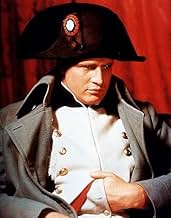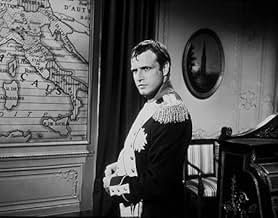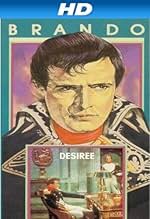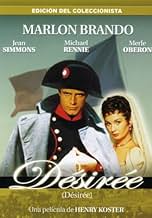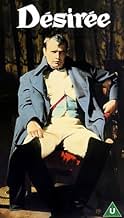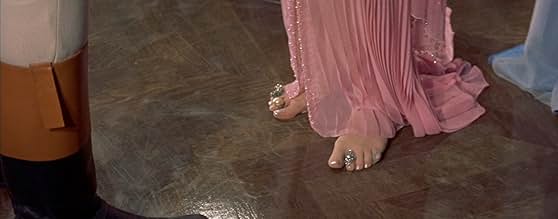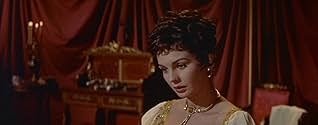Désirée
- 1954
- Tous publics
- 1h 50m
IMDb RATING
6.4/10
3.8K
YOUR RATING
Desiree Clary falls for Napoleon but marries Bernadotte, while Josephine weds Napoleon to become Empress before being dismissed for not producing an heir.Desiree Clary falls for Napoleon but marries Bernadotte, while Josephine weds Napoleon to become Empress before being dismissed for not producing an heir.Desiree Clary falls for Napoleon but marries Bernadotte, while Josephine weds Napoleon to become Empress before being dismissed for not producing an heir.
- Director
- Writers
- Stars
- Nominated for 2 Oscars
- 2 nominations total
Leon Alton
- Party Guest
- (uncredited)
Louis Borel
- Baron Morner
- (uncredited)
Sven Hugo Borg
- Aide
- (uncredited)
Peter Bourne
- Count Brahe
- (uncredited)
Paul Bradley
- Party Guest
- (uncredited)
- Director
- Writers
- All cast & crew
- Production, box office & more at IMDbPro
Featured reviews
Henry Koster directed many films with considerable charm and flair... His attempts at drama were for the most part less successful but always visually pleasant... He was nominated for an Academy Award for directing "The Bishop's Wife" in 1947... His reputation as a skilled artist led to his assignment as director of the first film in CinemaScope, "The Robe."
Koster does manage to keep the dynamism of "Désirée" and is excellent on both the technical level as on the screen acting... The film won Oscar Nominations for Best Art Direction-Set Decoration, Color & Best Costume Design...
His high moment of the film was 'The Coronation Ceremony' where after the blessing of the crowns Napoleon seizes the crown from the Pope Pius VII and crowns first himself, then Josephine (Merle Oberon), Napoleon's first wife... (This petite brunette looked particularly ravishing as the empress).
Marlon Brando proved his versatility playing the great French soldier-statesman, a man insatiably ambitious, exceptionally intelligent, prompt to make decisions... Brando's performance is cool, calculating, compulsive, using a calm, measured English accent, providing the role its wise temperature of the most celebrated personage in the history of France & Europe...
British actor Michael Rennie plays the revolutionary general Jean-Baptiste Bernadotte with a noticed antipathy for his rival... Bernadotte shifts his allegiances, forming alliances with Russia, Great Britain & Prussia, contributing in the defeat of Napoleon at the Battle of Leipzig...
Jean Simmons - lovely as ever with her delicate beauty - gives the story fluid charm of a seventeen-year-old girl to a self-confident woman... We see her running through the streets of Marseilles, growing up in the outcome of the French Revolution, recording her daily written account of events, witnessing Napoleon's arrest...
Rescued from the threat of a jump into the Seine, Désirée rejects Napoleon's advances, and marries Count Bernadotte, now a Marshall of France...
Désirée was a romantic figure involved with two opposite characters: one as Emperor of France with an eternal search for wars and glory, and a king, uncertain sometimes about his capacities, with the necessity of a beloved queen besides him...
If not viewed as a history lesson, this fictionalized biopic is good entertainment and at least a point of departure for a study of a great French leader...
Koster does manage to keep the dynamism of "Désirée" and is excellent on both the technical level as on the screen acting... The film won Oscar Nominations for Best Art Direction-Set Decoration, Color & Best Costume Design...
His high moment of the film was 'The Coronation Ceremony' where after the blessing of the crowns Napoleon seizes the crown from the Pope Pius VII and crowns first himself, then Josephine (Merle Oberon), Napoleon's first wife... (This petite brunette looked particularly ravishing as the empress).
Marlon Brando proved his versatility playing the great French soldier-statesman, a man insatiably ambitious, exceptionally intelligent, prompt to make decisions... Brando's performance is cool, calculating, compulsive, using a calm, measured English accent, providing the role its wise temperature of the most celebrated personage in the history of France & Europe...
British actor Michael Rennie plays the revolutionary general Jean-Baptiste Bernadotte with a noticed antipathy for his rival... Bernadotte shifts his allegiances, forming alliances with Russia, Great Britain & Prussia, contributing in the defeat of Napoleon at the Battle of Leipzig...
Jean Simmons - lovely as ever with her delicate beauty - gives the story fluid charm of a seventeen-year-old girl to a self-confident woman... We see her running through the streets of Marseilles, growing up in the outcome of the French Revolution, recording her daily written account of events, witnessing Napoleon's arrest...
Rescued from the threat of a jump into the Seine, Désirée rejects Napoleon's advances, and marries Count Bernadotte, now a Marshall of France...
Désirée was a romantic figure involved with two opposite characters: one as Emperor of France with an eternal search for wars and glory, and a king, uncertain sometimes about his capacities, with the necessity of a beloved queen besides him...
If not viewed as a history lesson, this fictionalized biopic is good entertainment and at least a point of departure for a study of a great French leader...
Filmed when CinemaScope's original ratio was still in use by Twentieth's cinematographers and with production values ladled on with an apparently generous budget (though no authentic European locations), "Desiree" is somewhat of a disappointment in many respects. Surprisingly Merle Oberon, as Josephine, remains in my memory as giving a touching (and, of course, glamorous) performance, but virtually everyone else (including Jean Simmons, one of my special favorites) fails to impress. Perhaps the emphasis on recounting the exploits of Napoleon Bonaparte from the perspective of one of his early, and unrequited, romantic conquests is the reason the whole enterprise seems like an undistinguished piece of overstuffed furniture...comfortable but hardly worthy of praise as an artisan's finest achievement. As an entertainment, typical of the Fifties, it was worth the price of admission when first released but I rather doubt that I'll join a chorus requesting Fox Home Entertainment to give this a DVD release in a widescreen format.
I've never seen a Brando film before. I've never seen a Napoleon film before. But after studying Napoleon in World history class and seeing Desiree, I've come to the conclusion the Brando must be a descendant of Napoleon or something. He IS Napoleon. I wasn't that interested when my grandmother suggested it, but I don't take things at face value. I check it out. True it's not incredibly accurate, historically speaking, though a lot of it is true and someone certainly did their research. If I recall my history class correctly someone once called Napoleon "The greatest Godless man alive." or something like that. But Brando IS Napoleon. No Question.
The strange thing about this movie is that it really is what its title promises -- the story of Desiree, and nothing more. Made in the dark years before the feminist movement, (indeed, in the worst days of the feminine mystique) the film makers seem to assume that the "ideal" woman is warm, impulsive, kittenish, flirtatious and yet non-sexual. Desiree is forever stuck at the end of childhood. She lives through great events but her "womanly" nature makes her ignore everything but her own physical comfort. She is Scarlett O'Hara without the suffering, cruelty or ambition, and Natasha Rostov without the fellow-feeling, patriotism and mystical sympathy for others. It's odd how you feel enchanted by her, and yet you feel disgusted with yourself for wanting a girl who remains infantile in so many ways. Truly a guilty pleasure.
Some of the things Desiree says in this movie are beyond belief. For example, after she becomes Princess of Sweden, her husband suggests that she needs some tutors, and she cries, "I haven't learned anything since I was ten!" And like, who is supposed to stand up and cheer? You could be the worst sexist pig in the world and this movie would make you feel like Anna Quindlen.
Or take the scene where the Swedes arrive in the middle of the night and tell Marshall Bernadotte (a superb Michael Rennie) that he is now in line to be King of Sweden. Bernadotte tells Desiree, his wife, to hurry up and get dressed. "Put on anything, you understand?" And she wails, "no, no, I don't understand anything!" Some other comments have said Jean Simmons is "whining" in this movie. But it's much worse than that. She's really pure feminist Kryptonite! The whole point is that men find her irresistible because she always, always, plays dumb and does nothing but bleat about being hungry, tired, or confused.
Problem is, Jean Simmons is just so natural and so attractive that it sort of goes down easy. You really do find yourself wanting to hug her every other scene, if you're a man anyway. If you're Anna Quindlen you probably just want to slap her. She's the feminist anti-Christ.
At least she's not a blonde!
Some of the things Desiree says in this movie are beyond belief. For example, after she becomes Princess of Sweden, her husband suggests that she needs some tutors, and she cries, "I haven't learned anything since I was ten!" And like, who is supposed to stand up and cheer? You could be the worst sexist pig in the world and this movie would make you feel like Anna Quindlen.
Or take the scene where the Swedes arrive in the middle of the night and tell Marshall Bernadotte (a superb Michael Rennie) that he is now in line to be King of Sweden. Bernadotte tells Desiree, his wife, to hurry up and get dressed. "Put on anything, you understand?" And she wails, "no, no, I don't understand anything!" Some other comments have said Jean Simmons is "whining" in this movie. But it's much worse than that. She's really pure feminist Kryptonite! The whole point is that men find her irresistible because she always, always, plays dumb and does nothing but bleat about being hungry, tired, or confused.
Problem is, Jean Simmons is just so natural and so attractive that it sort of goes down easy. You really do find yourself wanting to hug her every other scene, if you're a man anyway. If you're Anna Quindlen you probably just want to slap her. She's the feminist anti-Christ.
At least she's not a blonde!
My first introduction to this stroy was when my best friend gave me a copy of a very battered "Desiree" by Annemarie Selinko. When I found this movie, I was skeptical. I love the book, and most often, when books are made into movies, they are ruined. I was pleasantly surprised to find that the movie fit in so well with the book, and in fact used some of the same dialogue.
I felt that all of the actors did a remarkable job. Desiree was almost exactly the way that I had pictured her. Jean-Baptiste was also very like the image I had previously formed. Napoleon was amazing. He was so like the real Napoleon, I didn't have any trouble beliving that it really was him. Even though there were some things left out, like the end of the book and therefore the end of the story, I enjoyed it very much. I would not object to seeing this movie more, and it made my love for the book increase a great deal.
If you loved the movie, and even if you didn't, I would suggest getting a copy of the book. The romance between Desiree and Napoleon is much more pronounced as well as Desiree's love for Jean-Baptiste. The story-line is the same, but the end gives you the much needed satisfaction of seeing Desiree back in Sweden.
In my opinion, this is a first-rate movie, and I reccommend it to all.
I felt that all of the actors did a remarkable job. Desiree was almost exactly the way that I had pictured her. Jean-Baptiste was also very like the image I had previously formed. Napoleon was amazing. He was so like the real Napoleon, I didn't have any trouble beliving that it really was him. Even though there were some things left out, like the end of the book and therefore the end of the story, I enjoyed it very much. I would not object to seeing this movie more, and it made my love for the book increase a great deal.
If you loved the movie, and even if you didn't, I would suggest getting a copy of the book. The romance between Desiree and Napoleon is much more pronounced as well as Desiree's love for Jean-Baptiste. The story-line is the same, but the end gives you the much needed satisfaction of seeing Desiree back in Sweden.
In my opinion, this is a first-rate movie, and I reccommend it to all.
Did you know
- TriviaAlthough Marlon Brando didn't take his role seriously--despite every effort by director Henry Koster--"Desiree" outgrossed his other 1954 film, "Sur les quais... (1954)."
- GoofsNapoleon didn't conceive of the idea of attacking Italy. France had been fighting Austria in the War of the First Coalition since April 1792. France and Austria had armies facing each other in northern Italy. Napoleon was appointed to command the French army in Italy on March 1, 1794. he took command on the 26th and proceeded to inflict a series of defeats on the Austrian Army in the eastern Po River valley.
- Quotes
Count Brahe: You will enjoy life in Sweden, madame. Stockholm is called the Venice of the north.
Desiree Clary: [Shivering] I prefer the Venice of the south!
- ConnectionsFeatured in Biography: Darryl F. Zanuck: 20th Century Filmmaker (1995)
Details
- Release date
- Country of origin
- Languages
- Also known as
- Desirée, la amante de Napoleón
- Filming locations
- Château de Fontainebleau, Fontainebleau, Seine-et-Marne, France(location shooting)
- Production company
- See more company credits at IMDbPro
Box office
- Budget
- $2,720,000 (estimated)
- Runtime
- 1h 50m(110 min)
- Color
- Aspect ratio
- 2.55 : 1
Contribute to this page
Suggest an edit or add missing content


